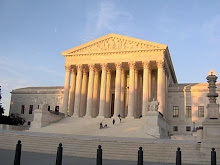On Feb. 24, a local news anchor named Rick Dancer announced on the 11 O'Clock news that he would be quitting his job to run for Secretary of State as a Republican candidate. The other anchor interviewed Dancer for a few minutes about why he is running and asked some questions about his career in journalism, which has spanned almost 20 years (I couldn't figure out how to link the video of the announcement, but the station's Web site is here ). The incumbent, an extremely popular Democrat, is leaving because his term limit has expired. While there are other Democratic candidates, Dancer is the first Republican to throw his hat into the ring.
In the broadcast, Dancer said that he was making the announcement on the show because no other media outlet was going to be allowed to beat the station to the news that one of its anchors was joining the race.
According to an article in The Register-Guard newspaper, the CEO of the company that owns Dancer's station has donated large sums of money to "Republican causes at the local, state and federal levels."
As the Register-Guard article points out, Dancer's on-air announcement raises serious questions of fairness, as well as ethical questions about whether a working journalist should continue to work while considering a run for political office ...
What interests me about this story is the question of whether Dancer's announcement violates the principle of equal coverage for political candidates. From the Register-Guard article: A 74-year-old principle of U.S. broadcast law is that opponents of candidates running for office should have a near-equal shot at the public’s airwaves.
This “equal opportunity” principle is why NBC had to remove from the air episodes of Law & Order when Fred Thompson — who acted in the show as a district attorney — was running for president last year.
Also: “‘Bedtime for Bonzo’ didn’t get much play when Ronald Reagan was running for president because any entertainment program in which a candidate appears would trigger equal opportunity,” said Tim Gleason, dean of the University of Oregon School of Journalism and Communications.
If an appearance of a candidate invokes the equal opportunity provisions, then the candidate’s opponents qualify for air time on the same basis. If the candidate didn’t pay for the time, the opponents don’t have to pay for the time.
But in Gleason’s view, Dancer’s announcement would not trigger the equal opportunity provision.
“A newscast is an exempt event under the equal opportunity rules,” Gleason said. “If he did it on the 11 o’clock news, that’s a newscast. It’s a fairly broad definition.”
But the issue isn’t crystal clear, said Robert Corn-Revere, a Washington, D.C., based partner with the law firm Davis Wright Tremaine, who has argued precedent-setting cases in this area of the law.
“There are exemptions for bona fide newscasts and news interviews, but not if it’s someone reporting on himself,” he said. “It would tend to circumvent the rule if you can get around it by having a kickoff to your campaign sponsored by your station.”
While I do understand that newscasts are exempt from the rules (and I agree with that exemption), I am unsure how I feel about a news anchor using his position as a news anchor to make his announcement. He doesn't have any competition yet (at least not for the primary election), but I would understand if other candidates were upset. This does look like an endorsement of one candidate by a station. While I do believe strongly that journalists should be transparent in their motives — I would be more suspicious if Dancer had resigned and the station did not cover his candidacy at all — I do not believe a journalist should be able to take advantage of his position in such a way. There is a reason journalists tend to avoid reporting on themselves or their coworkers. Even if Dancer's coworkers are not biased in his favor, this particular use of the news broadcast casts suspicion on the station's motives.
The response from the President of the company that owns the station, from the same article: “We’d probably put them on an interview,” he said. “We end up interviewing all the candidates anyway. That’s something our news department would consider.”
The spot, however, wouldn’t be at the top of the broadcast preceded by promotions, as Dancer’s was. “Probably not,” Chambers said. “Not unless they had 20 years as our anchor.”
This reads as a lack of understanding of the problem on the part of the President. Yes, Dancer worked for the station for 20 years, but the second he decided to become a political candidate, it ceased to be appropriate for him to work as a journalist. I would have no problem with his resignation announcement being at the top of the broadcast (or even with the montage of his favorite moments that ran later in the show). However, the declaration of his candidacy should have not been treated differently than announcements from other candidates. The appropriate thing for the station to do would have been to treat him like any other candidate.

No comments:
Post a Comment